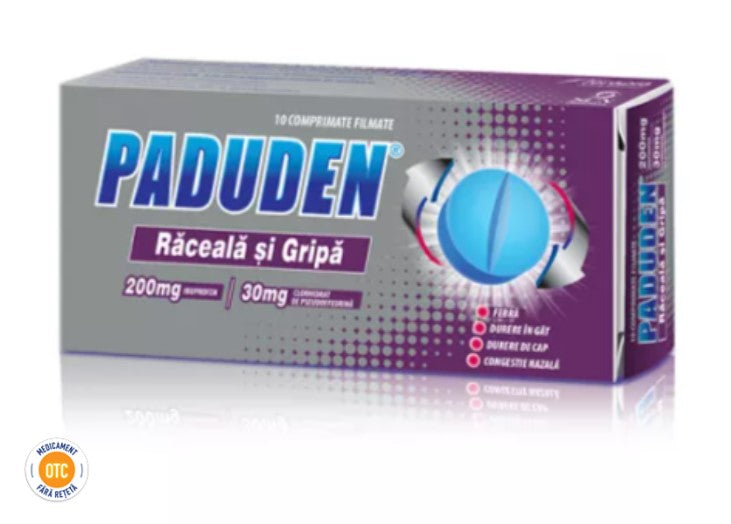joyofgiving.ro
Paduden Cold & Flu 200 mg/30 mg – Symptom Relief, 10 Tablets
Paduden Cold & Flu 200 mg/30 mg – Symptom Relief, 10 Tablets
Couldn't load pickup availability
Indications:
Paduden cold and flu contains two active substances:
Ibuprofen, which has anti-inflammatory, analgesic and antipyretic action (reduces fever).
Pseudoephedrine hydrochloride, which has a decongestant action for the upper respiratory tract and sinuses.
- anti-inflammatory, analgesic, antipyretic and decongestant for the upper respiratory tract and sinuses.
- it is recommended to be used in cases where both the anti-inflammatory/analgesic/antipyretic action of ibuprofen and the decongestant action of pseudoephedrine hydrochloride are required.
Contraindications:
Do not use Paduden cold and flu:
- hypersensitivity to the active substances (ibuprofen and pseudoephedrine hydrochloride), acetylsalicylic acid, other non-steroidal anti-inflammatory drugs (NSAIDs) or to any of the excipients of this medicine.
Precautions:
Talk to your doctor or pharmacist before using Paduden Cold and Flu.
Pregnancy, breast-feeding and fertility:
Paduden Cold and Flu should not be used during pregnancy or breast-feeding.
Pregnancy:
The medicine should not be used during pregnancy, taking into account that:
- inhibition of prostaglandin synthesis by ibuprofen may have a negative influence on pregnancy and/or embryonal/foetal development.
Data from epidemiological studies suggest an increased risk of spontaneous abortion, cardiac malformations and gastroschisis after use of a prostaglandin synthesis inhibitor in early pregnancy. The absolute risk of cardiovascular malformations increased from less than 1% to approximately 1.5%. The risk is assumed to increase in proportion to the dose and duration of treatment. In animals, administration of a prostaglandin synthesis inhibitor resulted in an increase in the number of pre- and post-implantation pregnancy losses and embryo-foetal lethality.
In addition, an increased incidence of various malformations, including cardiovascular, has been reported in animals given a prostaglandin synthesis inhibitor during organogenesis.
If ibuprofen is used by a woman attempting to conceive, the dose should be as low and the duration of treatment as short as possible. In the third trimester of pregnancy, all prostaglandin synthesis inhibitors may expose:
- the fetus to:
- cardiopulmonary toxicity (with premature closure of the ductus arteriosus and pulmonary hypertension);
- renal dysfunction, which may progress to renal failure with oligohydramnios;
- the mother and neonate, at the end of pregnancy, to:
- a possible prolongation of bleeding time, an antiplatelet effect which may occur even at very low doses;
- inhibition of uterine contractions, with delay or prolongation of labour by ibuprofen.
There is a possible relationship between the occurrence of foetal malformations and exposure to pseudoephedrine during the first trimester of pregnancy.
Breastfeeding:
The use of the drug in breast-feeding women is contraindicated because:
- ibuprofen is excreted in human milk, although at therapeutic doses during short-term treatment, the risk of harm to the infant seems unlikely;
- pseudoephedrine is excreted in breast milk in large quantities and may cause cardiovascular and neurological adverse reactions in the infant.
Fertility:
The use of ibuprofen may impair fertility and is not recommended in women attempting to conceive. In women who have difficulty conceiving or who are being investigated for infertility, discontinuation of ibuprofen should be considered.
Driving and using machines:
The following uncommon side effects have been reported with the combination of ibuprofen and pseudoephedrine hydrochloride: headache, fatigue, drowsiness, nervousness, vertigo, asthenia, palpitations and visual disturbances.
It is recommended to avoid the administration of PADUDEN Cold and Flu in people who drive or use machines.
Method of administration:
Always use this medicine exactly as described in this leaflet or as your doctor or pharmacist has told you. Talk to your doctor or pharmacist if you are not sure.
Adults:
The recommended initial dose is 1-2 film-coated tablets. If necessary, the treatment will be continued with 1 or 2 film-coated tablets every 4-6 hours.
The maximum recommended dose is 6 film-coated tablets in 24 hours (1200 mg ibuprofen).
Children under 12 years of age:
Not to be given to children under 12 years of age and weighing less than 40 kg.
If you have any further questions on the use of this medicine, ask your doctor or pharmacist.
Composition:
Each tablet contains: ibuprofen 200 mg and pseudoephedrine hydrochloride 30 mg.
Presentation:
10 film-coated tablets
Share

